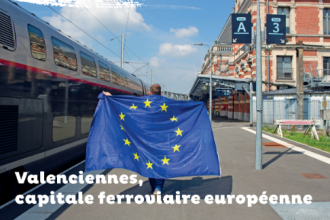
The European Union Agency for Railways celebrates its 20th anniversary!
We invite you to read an article published in June 2024 in a French newspaper, discussing, among other things, the 20th anniversary of the Agency.
Some say, "Europe is far away, and it's complicated, we don't understand anything about it!"
A Parliament, a Commission, a Council, twenty-seven member states, a multitude of parties... and all these people discuss, agree, disagree, form diverse coalitions, and ultimately adopt laws applicable to 450 million Europeans. 60% of our laws originate from the European Union... so Europe is also close.
If our students spend a semester in Croatia as part of the Erasmus program, it is thanks to the equivalence of training and diplomas established at the European level. And vacations in Spain are much easier with euros than with pesetas! As for the harmonization of railway regulations across European countries, decisions are made in Brussels, but the work is done in Valenciennes! And who does not feel proud to be a member of this community of nations that has put Europe on the right track?
Another peace initiative: the Olympic and Paralympic Games. The flame, which will be in Valenciennes on 25 August, embodies the values associated with the symbolism of fire: courage, friendship, excellence, respect... Twenty-four torchbearers will carry it, highlighting the clubs and associations that, through sport, promote inclusion and a harmonious living together.
Did you know that it is from Valenciennes that most of the market authorisations for trains running in Europe are issued, from the most sophisticated TGV to a simple freight wagon?
Since 2019, issuing most of the market authorisations for trains running in Europe has been one of the tasks of the European Union Agency for Railways, established in 2004 in Lille and Valenciennes. It employs two hundred people of twenty-three nationalities, mostly engineers or lawyers, and since its creation, it has been working to build a true European railway network from the patchwork of national networks.
In addition to authorising rolling stock, the agency also handles the certification of companies such as SNCF and its European counterparts, the development of a unified signaling system, and the harmonization of technical and operational rules that have long diverged since the origin of the railway. Railway networks expanded between 1860 and 1930, at a time when the main concern of each state was to prevent its neighbors from being able to run their trains. The era was one of mistrust and wall-building. Nowadays, on the contrary, we dream of being able to travel from Paris to Lisbon or from Berlin to Athens without changing trains: the European project has torn down walls to build bridges, times have changed, and that's a good thing!
Railway infrastructure and rolling stock have long lifespans, and their harmonisation takes time: track gauge and electric power supply are perfect examples of divergences, but there are many others. The agency has identified no less than fourteen thousand different regulations in European countries and is systematically "cleaning" them as harmonization progresses. So, the next time you take the train, whether in Valenciennes, Mons, Düsseldorf, Seville, or Budapest, consider that it might be in Valenciennes that this train's compliance with European rules was evaluated and the decision to grant it market authorisation was made!
The European Union hosts around forty specialised agencies across its territory, each created to fulfill specific, typically technical needs. They are spread throughout the Union's member states. When deciding on the location of an Agency, cities vie to host it. This was the case for the Valenciennes–Lille duo in 2004, with an original proposal: headquarters and offices in Valenciennes, meeting rooms in Lille. This choice proved astute, as the mayors of both cities, despite differing political affiliations, rallied behind the candidacy, securing its success. Valenciennes' selection for the railway agency is an exception, as most Agencies are located in capitals or larger cities.
The views and opinions expressed in this article are those of the original author and the newspaper and do not necessarily reflect the official policy or position of ERA. The purpose of sharing this article is to highlight the positive work and achievements of the Agency as reported by various media outlets. The Agency is committed to maintaining a neutral and inclusive stance, respecting all religious and non-religious perspectives. For any questions or concerns regarding this content, please contact communication era [dot] europa [dot] eu (communication[at]era[dot]europa[dot]eu)
era [dot] europa [dot] eu (communication[at]era[dot]europa[dot]eu)